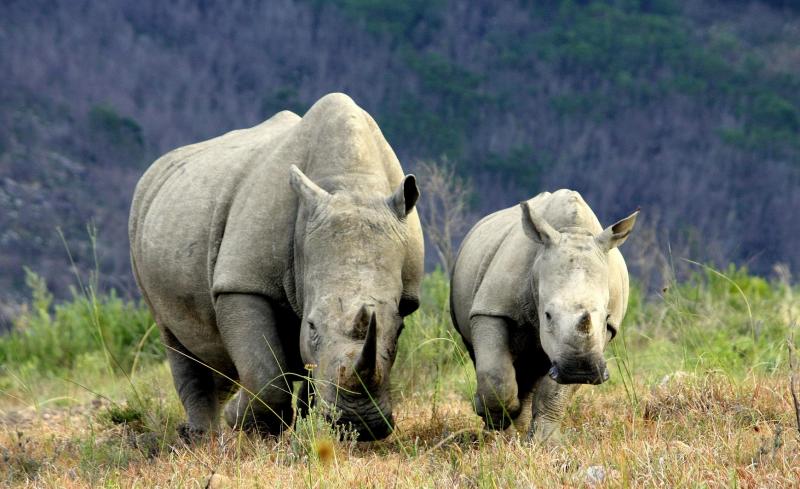
Rhino Farming – is this a solution to curb poaching?
By Fiona Gordon
I'm almost nervous to say the words 'rhino farming' – such an alien concept to me, when I am only used to thinking of rhino as wild creatures roaming free, but what animal is free in today's world, we've left so little land for wilderness and wildlife.
Sitting in a crowded room last night listening to the largest private owner of rhino's in South Africa, John Hume, present his case in favour of rhino farming, it did seem a bit one sided, Mr Hume did refer to the dreaded 'greenies' which got my hackles up, as I tend generally to side with the 'greenies', but as I listened, his argument in favour of rhino farming made sense.
.
The crux of the matter is that rhinos are worth more dead than alive and that situation needs to be flipped on its head.
A lot of dates and facts and figures were bandied about on slides, which showed that South Africa had a number of years when poachers didn't need to infiltrate our reserves and hack at our herds, because they were getting their sources from elsewhere (oh poor Africa how she bleeds) via various means, many rather dubious to say the least. As poachers looked elsewhere to find horn as their resources began to dwindle (for various reasons) South Africa became the focus of attention. Steps to halt/control the commercial enterprise around rhino and rhino horn trade were instituted to try to curb the movement/sale of rhino horn by poaching syndicates – this was done in good faith to try to protect the rhino, however it appears to have had the opposite effect by making the 'goods' harder to obtain, the price has gone up, and therefore rhino horn is all the more attractive to poachers and syndicates.
In South Africa recently, the 'Threatened or Protected Species Act' meant that farmers needed permits for all processes pertaining to their rhinos – a permit to anaesthetize a rhino, a permit to move a rhino, a permit to remove a rhino horn, a permit to store the rhino horn and so on – prohibitive and costly for farmers. The second step was another piece of legislature by government on a moratorium on the sale of rhino horn. Rhinos are now 'unattractive' to farmers and more attractive to poachers and poaching syndicates and the inevitable result of raising the black market value of rhino horn.
.
Mr Hume laid out a number of facts with regards to rhino poaching and farming:
o The ban on trade in rhino horn has been in place for 35 years and it has had no impact on poaching – rhino numbers have continued to reduce at an alarming rate.
o In the 1960's it was estimated that throughout Africa there were around 100 000 rhinos. In the 1970's numbers were down to 65 000. The ban on rhino horn trade came into effect in 1977 to try to stop this downward spiral and it has had no effect whatsoever. Today it is estimated that there are only 20 000 rhinos remaining, based on whether the numbers in the Kruger National Park are accurate. The last credible count on rhino numbers in the Kruger Park was done in 2007. Another credible count of Kruger's rhinos needs to be undertaken to establish actual numbers – everyone hopes that there are still at least 10 000 rhinos in Kruger – IF NOT – the situation for rhinos is far more dire.
o Mr Hume's aim is to breed 200 rhino a year in captivity. From experience he knows that the majority of the calves will be born male. So from 200 lets just say that there will be 110 males born and 90 females born. Mr Hume only requires approximately 10 of those males to service (or impregnate) the 90 female rhino. What is to be done with the surplus male rhinos?
At the moment Mr Hume keeps all of the male rhinos on farms and looks after them – they are supplementary fed – but this is hugely costly for farmers.
o Typically poachers (and hunters) take an adult rhino at around 8 – 10 years of age – this is when their horn is large and the poacher can get about 6-7kgs of horn from the animal. However in a rhino's life time he can produce about 60kgs of horn as his horn once removed will grow back again. A rhino can live for 40 years! Would it not be better for the males to be viewed as having commercial value as their horns can be harvested.
.
Mr Hume's points on 'WHY LEGALIZE RHINO FARMING'
o Consumers have the option of buying from legal, ethical and controlled sources, instead of from the poachers!
o If rhinos have commercial value (both male and female) via controlled farming methods, the assistance from local communities who can become involved in rhino farming will be significant, in that a rhino alive will bring in much needed income and will be a more sustainable income than what poaching can provide. Community buy-in (excuse the pun) is essential, as poor communities are tempted to poach as the income generated is substantial.
o Male rhinos have the 'guillotine' hanging over their heads because females are more valuable and there are 'too many' male rhinos in relation to the female numbers. However if the male horn can be farmed there is now a commercial value and an incentive to keep rhinos alive. They become worth more alive than dead.
o Many species have gained stature throughout the world by allowing humane farming for commercial value.
.
Mr Hume also pointed out that it is not difficult to re-introduce 'farm' rhino that are fed via supplementary means, back into the wilds. Rhino are one of the few species that have little difficulty moving from captivity and reverting back into a wild state with relative ease. Once the scourge of poaching has been minimized by the legalization of trade in rhino products, then these captive numbers can be re-introduced into the wilds once again.
All this talk about money is rather sickening, but it is naive to think that people will value wildlife simply for the intrinsic value that all living creatures including humans have in this world.
South Africa doesn't want to replicate the failures of other countries to protect their rhino, because the fact is, at the moment we are losing the war on rhino poaching. Drastic measures are required and perhaps controlled farming is the drastic step needed.
We still need the anti-poaching units, and yes more than ever we need education, but education is a long term approach and we need an immediate solution to stop the extinction of our rhino.
We do not want their beauty to simply be the stuff of legends as we sit around a camp fire and tell stories of magnificent beasts that once roamed the length and breadth of Africa.
How do you feel?
*****************************************************************************
Africa Cries Film Production Company produces short films on the endangered species of Africa to assist with education through this medium.
The short film and story that was presented to the audience at the start of the evening, of Rhineo & Juliet tells a humanized tragic tale of the plight of the rhino in Africa. It is an emotional production to educate and influence by being graphic and informative.
.
*****************************************************************************
.
Related Articles:
o 12 Dec '12 – Our Beautiful Rhinos – one killed every 13.4 hours!
o 25 Sep '12 – Rhino Parade – Colorful & Tangible – Celebrity Focused
o 19 Sep '12 – World Rhino Day
o 16 Jul '12 – Exquisite Vulnerability
o 06 Jun '12 – Dep of Environ Affairs – Announces Talks with Rhino Owners
o 04 Jun '12 – Become a Rhino Ambassador
o Rhino Wilderness Trails
*****************************************************************************
.
Intriguing Africa Holidays & Safaris offer tailor made holidays for travellers to South Africa and into Africa.
Whether you are on honeymoon or visiting South Africa to get married on safari, family safaris or groups – tailor made essentially means that we will package a holiday that suits each client’s budget and desires.
Africa’s allure is the exotic; fascinating tribal cultures, vast open spaces from the Namib Desert to the waterways of the Okavango Delta – wilderness and wildlife.
Africa also has its fair share of golden coastline and tropical islands of the Indian Ocean. A holiday of wildlife, sun and sea is a great combination – bush & beach.
Please get in touch with us should you require any guidance on your travels in Africa, and afford us the opportunity to quote you on your African adventure.
Get in touch on info@africaholidaysandsafaris.com or +27 (0)78 803 2287 or visit our website at www.africaholidaysandsafaris.com
Share this article:




















